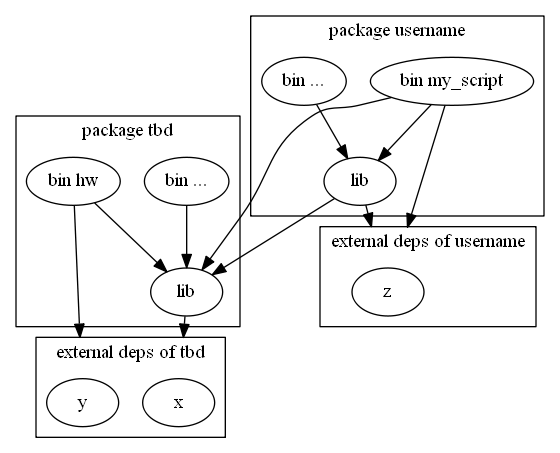Let's say relatively recent nightly toolchain. OS is not important, this should work on any major one.
(The following is oversimplification and lies but this shit is confusing as it is already.)
Package is a thing with Cargo.toml. It's a unit of dependency management.
A package contains exactly one lib compilation unit and any number of bin compilation units.
By the way, Rust docs and compiler messages use the word "crate" to refer to packages and compilation units, depending on the context.
Lib compilation unit is a tree of modules with the root at src/lib.rs.
This tree structure could be defined either inline, or in separate files. Or any combination.
// src/lib.rs
root stuff
mod my_module {
my_module stuff
mod my_submodule {
my_submodule stuff
}
}This is the same module structure as
// src/lib.rs
mod my_module;
root stuff
// src/my_module.rs
mod my_submodule;
my_module stuff
// src/my_module/my_submodule.rs
my_submodule stuffModule hierarchy is important for visibility: a submodule has access to the private stuff of its parent module. Aside from that, modules are kind a like namespaces.
Bin compilation unit is a single file like src/bin/my_executable.rs.
Dependencies are declared at the level of packages ("package A depends on package B").
In terms of compilation units:
- bin compilation units can use stuff from the lib compilation unit of their package
- bin and lib compilation units in package A can use stuff from the lib compilation unit in package B
- stuff defined in bin compilation units can't be used in other compilation units
Cargo.toml <-- package "tbd"
src/
lib.rs <-\
module1.rs <-|- lib compilation unit "tbd"
module2.rs <-/
bin
hw.rs <-- bin compilation unit "hw"
scratches/
username/
Cargo.toml <-- package "username"
src/
lib.rs <-- lib compilation unit "username"
bin/
my_script.rs <-- bin compilation unit "my_script"
Package "tbd" is what we used to call "production".
Package "username" declares "tbd" as an external dependency.
Compilation units and what they can use:
cargo test # run all tests in package "tbd"
cargo test -p username # run all tests in package "username"
cargo test --all # run all tests in all our packages
cargo run --bin hw # run hw.rs in package "tbd"
cargo run -p username --bin my_script # run my_script.rs in package "username"
data/: For stuff made by humans for computers. Like examples from the problem statement that you want to use in tests. Everything here is under version control. Maybe don't commit tons of generated files here without a good reason.outputs/: For stuff made by computers for humans. Like logs, images rendered by visualizers, etc. Not under version control.cache/: For stuff made by computers for computers. Like build artifact cache. It should be safe to delete at any time (should be regenerated if needed). Not under version control.
By the way, there is an utility function for dealing with project-relative paths:
project_path("data/zzz") returns absolute path to this file independently of the current directory.
Try to avoid breaking compilation and tests in the package tbd.
Breaking scratches is gray area.
To help with that, create the file .git/hooks/pre-push with the following content:
#!/bin/sh
cargo test
# alternatively,
# cargo test -p tbd -p my_username
and run chmod +x ./git/hooks/pre-push.
To test the hook, run git push --dry-run.
To bypass the hook in case of emergency, git push --no-verify.
